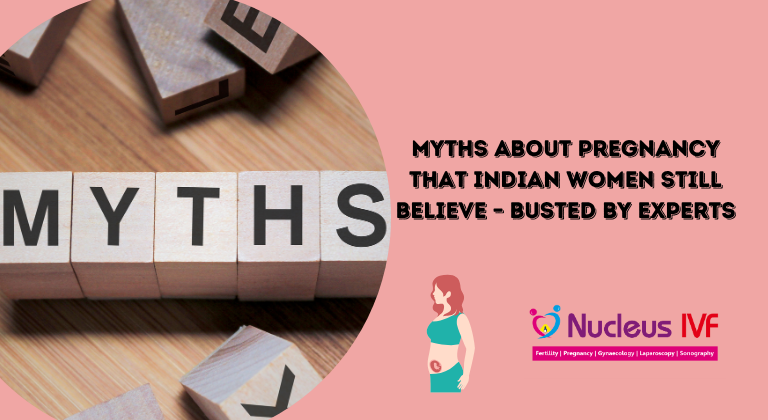Myths About Pregnancy That Indian Women Still Believe – Busted by Experts
Pregnancy in India is not just a medical journey—it’s also a cultural one. The moment you announce your pregnancy, advice (often unsolicited) comes pouring in from elders, neighbors, and even strangers. While some tips are based on traditional wisdom, many are rooted in myths rather than science.

At Nucleus IVF Clinic, Wakad, Pune, under the guidance of Dr. Pritam Sulakhe, we believe in empowering mothers-to-be with the right information. Let’s bust some of the most common pregnancy myths that Indian women are still told—and explain the actual truth behind them.
Myth 1: “If you’re carrying low, it’s a boy. If you’re carrying high, it’s a girl.”
🔍 Truth:
The shape or height of your baby bump has nothing to do with the baby’s gender. It depends on:
- The mother’s body type
- Baby’s position
- Number of pregnancies you’ve had
In India, where gender prediction is illegal and unethical, this myth not only misleads but can encourage unhealthy expectations.
Myth 2: “Don’t eat papaya or pineapple—they’ll cause miscarriage.”
✅ Truth:
This myth is widespread across Indian households. While unripe papaya contains latex which may cause uterine contractions in large amounts, moderate intake of ripe papaya and pineapple is completely safe for most women.
Unless your doctor advises otherwise, fruits like papaya and pineapple are rich in vitamins, enzymes (like bromelain in pineapple), and fiber, making them good for digestion and immunity during pregnancy.
Myth 3: “Pregnant women should avoid walking or exercising.”
💪 Truth:
This is completely outdated thinking. In fact, moderate exercise (approved by your doctor) is highly beneficial:
- Improves blood circulation
- Reduces back pain and bloating
- Boosts mood and energy
- Helps with better labor outcomes
📝 Note: Avoid high-risk activities like heavy lifting, but gentle yoga, walking, or swimming are encouraged unless your pregnancy is high-risk.
Myth 4: “Craving sweets means you’re having a girl; spicy food means it’s a boy.”
🍬🌶️ Truth:
Cravings are more about hormonal changes and nutritional deficiencies, not about the baby’s gender.
For example:
- Craving chocolate might mean your body needs magnesium
- Wanting spicy food could be due to metabolism changes
There’s no scientific evidence linking cravings to the baby’s sex.

Myth 5: “You must eat for two!”
🍽️ Truth:
This myth can lead to unnecessary weight gain and gestational diabetes.
✅ Doctors recommend:
- Only 300–500 extra calories per day in the second and third trimesters
- Focus on nutrient-dense foods: proteins, healthy fats, leafy vegetables, fruits, and whole grains
Instead of doubling quantity, double your nutrition.
Myth 6: “Avoid cutting your hair during pregnancy.”
✂️ Truth:
This is a cultural belief in many Indian families, but it has no medical basis.
Hair growth often improves during pregnancy due to hormones. If cutting your hair makes you feel comfortable and fresh—go for it! It doesn’t harm the baby in any way.
Myth 7: “Black thread, lemon, or iron under the pillow will protect you from ‘evil eyes.’”
🧿 Truth:
Many families follow these rituals to ward off the “nazar” (evil eye). While these customs might bring emotional comfort or cultural pride, they have no impact on medical outcomes.
What truly protects you and your baby is:
- Prenatal care
- Good hygiene
- Balanced diet
- Regular scans and checkups
Myth 8: “Avoid cold foods—they’ll make the baby sick or cause a cold.”
❄️ Truth:
Pregnancy doesn’t change how your immune system reacts to cold foods. Eating curd, fruits from the fridge, or cold beverages in moderation is safe unless you have a sensitive throat.
This myth likely originated from avoiding infections in earlier generations when food storage was less hygienic.
Myth 9: “If you lie on your back, the baby will suffocate.”
🛏️ Truth:
In later pregnancy (after 20 weeks), lying flat on your back for a long time can reduce blood flow due to pressure on the vena cava. But it won’t “suffocate” the baby.
✅ Best sleeping position:
- Left side—improves blood flow to the placenta
- Use pillows to support your back and belly
Myth 10: “You shouldn’t travel at all during pregnancy.”
🚗 Truth:
Traveling is generally safe in the second trimester (weeks 14 to 28), provided:
- You avoid bumpy rides
- You take frequent breaks (if it’s a road trip)
- You stay hydrated and wear a seatbelt properly
For air travel, consult your OB-GYN. Most airlines allow travel until 36 weeks if there are no complications.
Why These Myths Persist
India is a deeply traditional country where pregnancy is wrapped in cultural practices. These myths continue because:
- They’re passed down from elders
- Lack of medical awareness in rural areas
- Cultural need to feel “safe” by doing extra rituals
What Really Matters During Pregnancy
Instead of following outdated beliefs, focus on:
- Regular prenatal checkups
- Balanced, nutritious diet
- Physical and mental wellness
- Avoiding alcohol, smoking, and excessive stress
- Trusting your doctor over WhatsApp forwards
Expert-Backed Pregnancy Advice from Nucleus IVF, Pune
At Nucleus IVF in Wakad, Dr. Pritam Sulakhe ensures that every patient:
- Gets science-backed answers
- Has access to emotional support
- Receives clear, personalized pregnancy plans
Our team understands the Indian cultural context and helps you separate rituals from reality—so you can make informed decisions.
Final Thoughts: It’s Time to Break the Chain
If you’ve ever heard one of these myths and felt confused, you’re not alone. Pregnancy is a beautiful and sensitive journey. The last thing you need is fear or misinformation.
🌸 Instead, trust science, trust your body, and trust your doctor.
At Nucleus IVF Clinic, Wakad, Pune, we’re committed to giving you clarity and confidence through every step—from conception to delivery.
Ready for expert guidance? Book your consultation with Dr. Pritam Sulakhe today!
Dr. Pritam Prakash Sulakhe
Dr. Pritam Prakash Sulakhe
author
Dr. Pritam Prakash Sulakhe has completed his MBBS from B J Government Medical College , Pune which is one of the top medical College in India. He continued his post-graduation as DGO at same institute. After that he opted for Diplomat Of national Board In Obstetrics and Gynecology from Kerala Institute Of Medical Sciences Trivandrum, which is one of the most prestigious institute from South India.


